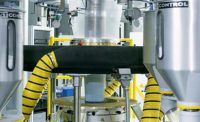Waupaca Foundry Inc. is a leading supplier of iron castings to the automotive, commercial vehicle, agriculture, construction and industrial markets. Using state of-the-art technology, the company produces castings from gray iron, ductile iron, HNM series high-strength ductile iron, and austempered ductile iron. The company melts some 9,500 tons of metal daily.
With approximately 4,000 employees nationwide, Waupaca Foundry is headquartered in Waupaca, WI, and operates six other foundries in Marinette, WI, Tell City, IN, Etowah, TN, and Lawrenceville, PA. The company also does machining and assembly operations in Waupaca and Effingham, IL.
Grinding castings is a strenuous and demanding job, and assigning workers to that necessary task is a real challenge for metal-casting operations. But it’s essential work, and as foundries produce higher volumes of castings, the risk of cumulative traumatic stress injuries increases proportionately.
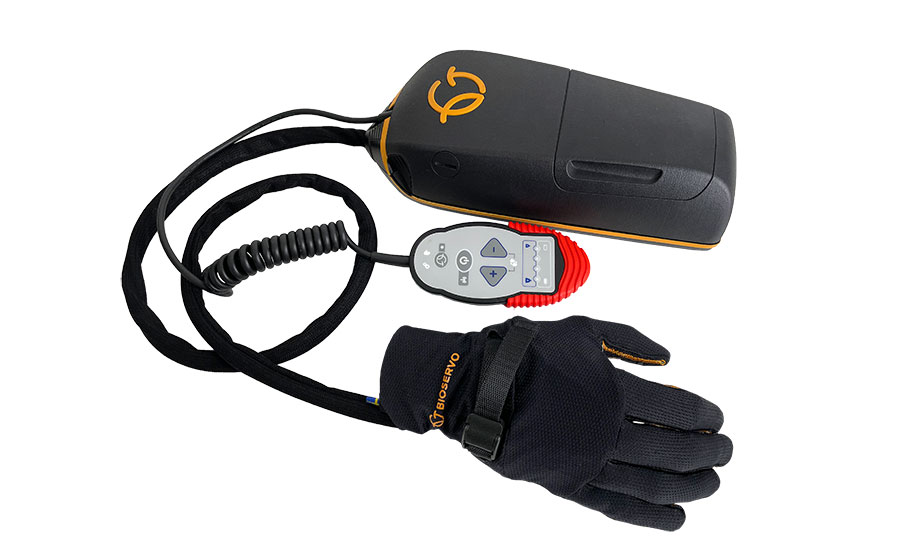
The Ironhand consists of a glove covering all five fingers, and a power pack worn in a backpack or hip-pack. Pressure sensors within the glove trigger servomotors within the power unit and give the wearer a more powerful grip. Photo courtesy Bioservo Technologies
To improve ergonomics, Waupaca Foundry is using an innovative adaptive technology to support workers who manually grind castings. The Ironhand glove is the world’s first soft exoskeleton designed for the human hand to improve grip strength and reduce effort. The system was tested at the Waupaca’s Etowah casting finishing plant and Marinette ductile iron foundry.
The system consists of a glove covering all five fingers, and a power pack worn in a backpack or hip-pack. Pressure sensors within the glove trigger servomotors within the power unit and give the wearer a more powerful grip, which is easily adjusted for each application.
The glove’s “soft extra muscle” strengthening technology merges neuroscience, mechatronics and robotics, and increases worker endurance for manual assembly tasks.
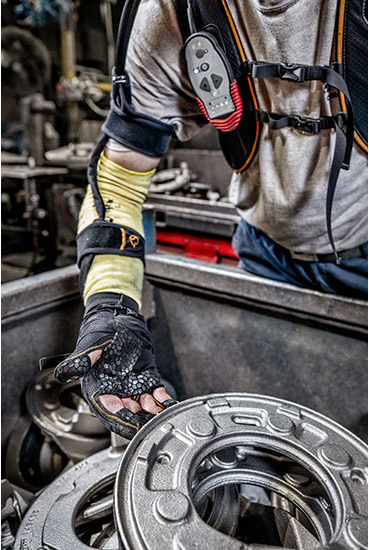
Via a Smart Assist function, the Ironhand system learns how each operator uses the glove and adapts the control system to provide just the right amount of force. Photo courtesy Waupaca Foundry Inc.
The glove is activated when the operator starts moving his hand to perform a task, using sensors located on the palm and on the fingers. Via a Smart Assist function, the system learns how each operator uses the glove and adapts the control system to provide just the right amount of force. The entire system weighs just 6 pounds and is integrated with existing personal protective equipment.
Last year, Waupaca purchased 30 Ironhand systems for testing at two facilities, and foundry workers report that the system supports their bodies, is comfortable, and is easy to operate. The glove is used most often in the casting grinding and press functions of the foundry where workers are performing repetitive tasks and lifting castings.
In February, the company purchased an additional 30 Ironhand systems for use at three other sites. Waupaca plans to expand the use of the device to additional foundry functions, such as in the molding and core room departments.
“For the last 25 years, we have improved technology with the goal to eliminate manual casting processing, but we cannot eliminate handling iron castings as part of our daily jobs,” says Jon Loken, director of safety and health at Waupaca. “This technology bridges the gap between manual processing and total automation.”
“The iron hand works well for holding onto air tools for an extended period of time,” adds Andrew Lang, a grinding operator in the mill room at Waupaca Foundry.
“I had to see what it was all about, so I said I wanted to try it,’ says Trever Godfrey, a mill room grinder. “It makes a big difference, because the glove takes over and does most of the work for you. It also took quite a bit of the vibration out of my arm.”
“Feedback from our employees is outstanding,” Loken says. “It’s better than imagined and this is one more step in our goal to improve ergonomics and the overall work environment for our team.”
Made in Sweden
The Ironhand was developed by a Swedish company Bioservo Technologies. The technology is designed to mimic the human body. The technology follows the user’s actions in an intuitive way and augments the gripping force only if the operator initiates a grasp.
Ironhand’s main ergonomic property is the ability to add force to the flexion of the fingers, helping to relieve muscles that are responsible for flexing and gripping. By reducing the amount of force and strain put on these tendons, Ironhand decreases the risk of cumulative traumatic stress injuries.
The Ironhand glove is equipped with artificial tendons and pressure sensors located on the palm and in the fingers’ middle phalanges and tips. The sensors detect when the user grabs an object, which triggers the servomotors installed in the power pack. A microcomputer then calculates the amount of power to be added and small motors pull the artificial tendons. As a result, the finger joints flex, and the grip is performed with less force needed by the operator. The harder the user grips, the more force is applied by Ironhand. The Smart Assist function uses machine learning and adapts the behavior of the glove based on how the operator is using it.
The Ironhand glove can be adjusted according to the user’s preferences, as well as the work situation at hand. Different combinations of force, sensitivity, locking tendency and finger balance can be saved as tailored profiles. The operator can preset multiple profiles and easily adjust the output and switch between these with a remote control located on the chest, or by using a smartphone app.
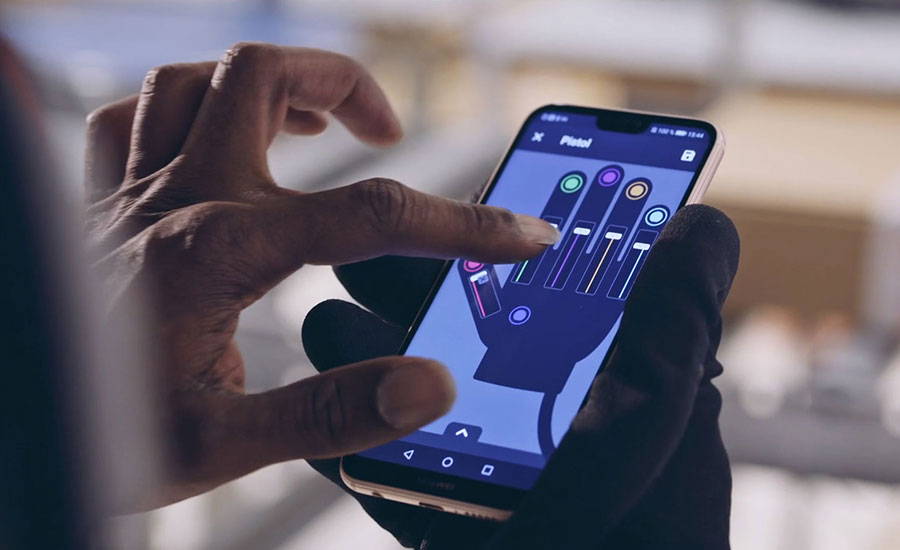
The Ironhand glove can be adjusted according to the user’s preferences. The operator can preset multiple profiles and switch between them with a remote or a smartphone app. Photo courtesy Waupaca Foundry Inc.
The glove is easy to put and off and comes in three sizes for both left and right hands. When designing the Ironhand, the company reduced the amount of textile in the fingertips to make it easier to perform complex tasks that require dexterity.
Through an app, plant managers can get an overview of all Ironhand equipment at a site, assign gloves to operators, access diagnostics, and create ergonomic risk reports. Ironhand has the option to always be connected, via 4G through the built-in sim card, or Wifi. This means that high-resolution data can be sent to ensure that the system functions as intended and that data for risk reports is continuously collected. Should connection not be available, data is stored locally in the device for later upload.
The device was designed to facilitate manual assembly operations, such as pressing, clipping or compressing, or operating power tools, such as grinders, drills, sander, welders, hammers and riveters.
The technology is in use in different manufacturing sectors, but the foundry environment provided unique challenges. Specifically, iron dust in the mill room was penetrating the gloves and connections, so insulation on the cables was enhanced. The company is continuing to improve the system during the product testing phase.
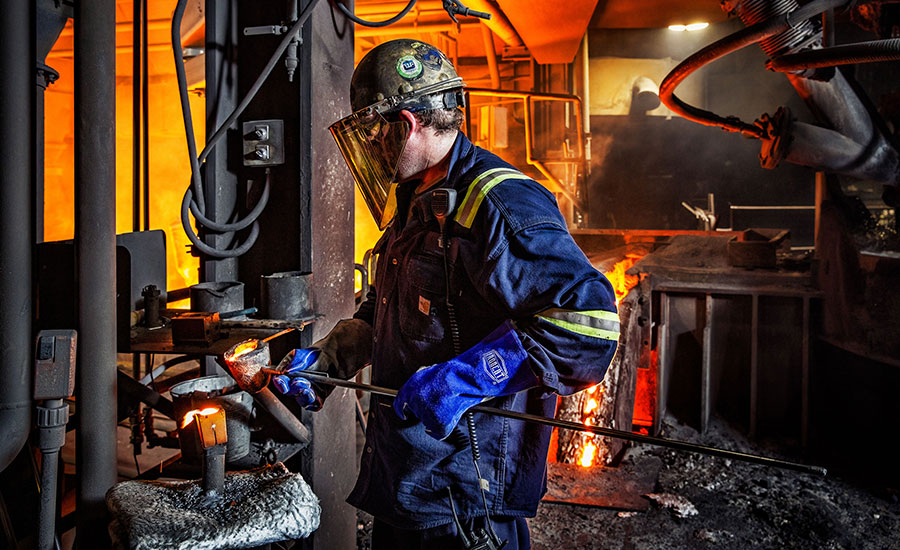
Bioservo Technologies worked with Waupaca Foundry to adapt its Ironhand technology for the tough environmental conditions of a foundry. Photo courtesy Waupaca Foundry Inc.
“The application with Waupaca Foundry opens new possibilities for Ironhand to truly make a difference for people in their daily work life within a large and demanding industry. The initial results show that a majority of workers who tested Ironhand want to use it in their daily work to stay healthy,” says Petter Bäckgren, CEO of Bioservo.
The system is being distributed by Rhino Tool House, which is supporting installations at multiple Waupaca locations throughout the Midwest and working with Bioservo to monitor the results.
“This is a product we are very excited about and we have deployed this in various production environments around the country,” says Chip Paulsen, president of distribution at Rhino Tool House, an exhibitor at The ASSEMBLY Show South in Nashville, TN, in May. “Everything from automotive factories, aerospace plants, warehousing, fabrication shops and now foundries are using the technology.”
Following a six-month trial and adjustment period, the Ironhand system will be implemented at all Waupaca Foundry locations. The partnership’s objective is to develop a long-lasting glove for use in both foundry and machining operations.
Bioservo created a similar system, the Carbonhand, for consumer use. Like its more robust cousin, the Carbonhand is a grip-strengthening glove with pressure sensors in the fingers that sense when the user needs support. The pressure sensors detect when the user initiates a hand grip, and the glove then applies the power needed to ensure a firm grip. Carbonhand comes in five sizes for right and left hands, and can apply a maximum force of 20 newtons per finger.
With Carbonhand, a large proportion of people with impaired hand strength can regain the majority of their hand function and resume activities and household activities. Consumers can use an app to create and customize their own personal profiles. For example, some people may need more support for leisure activities and less for simpler household activities. Users can then easily switch between profiles with the push of a button.
To see a video of the Ironhand in operation, click here.
ASSEMBLY ONLINE
For more information on ergonomic aids, read these articles:
Exoskeletons Lend a Lift at Ford
Flexible ‘Chair’ Provides Ergonomic Support
Exoskeletons Aid Assemblers at Truck Plant



